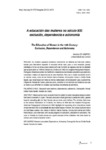A educación das mulleres no século XIX: exclusión, dependencia e autonomía

Ver/
Use este enlace para citar
http://hdl.handle.net/2183/16798Coleccións
Metadatos
Mostrar o rexistro completo do ítemTítulo
A educación das mulleres no século XIX: exclusión, dependencia e autonomíaTítulo(s) alternativo(s)
The Education of Women in the 19th Century: Exclusion, Dependence and AutonomyAutor(es)
Data
2013Cita bibliográfica
De Gabriel Fernández, N. (2014). A educación das mulleres no século XIX: Exclusión, dependencia e autonomía. Sarmiento. Revista Galego-Portuguesa De Historia Da Educación, 17, 7-36. https://doi.org/10.17979/srgphe.2013.17.0.4079
Resumo
[RESUMO] As mulleres quedaron excluídas inicialmente do sistema de instrución pública ideado polo liberalismo español. A exclusión inicial dará paso a unha inclusión parcial, orientada a formar as nenas para o desempeño das funcións de esposa e de nai. Os debates que se produciron en 1859 no Ateneo da Coruña e en 1892 no Congreso Pedagóxico Hispano- Portugués-Americano poñen de manifesto a hexemonía dun modelo educativo que pretendía consolidar o status de dependencia do sexo feminino. Pero nun e noutro escenario tamén se ouviron voces, como as de Antonio García Fuertes, Concepción Arenal e Emilia Pardo Bazán, que reclamaban con máis ou menos radicalidade unha educación para a autonomía. A figura de Rosalía de Castro, pola súa parte, constitúe un bo exemplo dos atrancos aos que se tiveron que enfrontar as mulleres que decidían converterse en escritoras [ABSTRACT] Initially women were excluded from the system of public education designed under the liberal movement in Spain. This early exclusion would give way to partial inclusion, geared towards educating girls for their futures role as wives and mothers. The debates that arose at the Cultural Association of A Coruña, the Ateneo, in 1859 and the Hispano-Portuguese- American Pedagogical Conference in 1892 highlight the hegemony of an educational model whose intention was to consolidate the dependent status of women. But voices could be heard on both these scenes –the voices of Antonio Garcia Fuertes, Concepción Arenal and Emilia Pardo Bazán, who defended, with varying degrees of radicalism, education for autonomy. The case of Rosalía de Castro serves as a good example of the obstacles that were faced by women who chose to become writers
Palabras chave
Educación das mulleres
Dependencia
Autonomía
Concepción Arenal
Emilia Pardo Bazán
Rosalía de Castro
Women’s education
Dependence
Autonomy
Dependencia
Autonomía
Concepción Arenal
Emilia Pardo Bazán
Rosalía de Castro
Women’s education
Dependence
Autonomy
Versión do editor
ISSN
1138-5863





